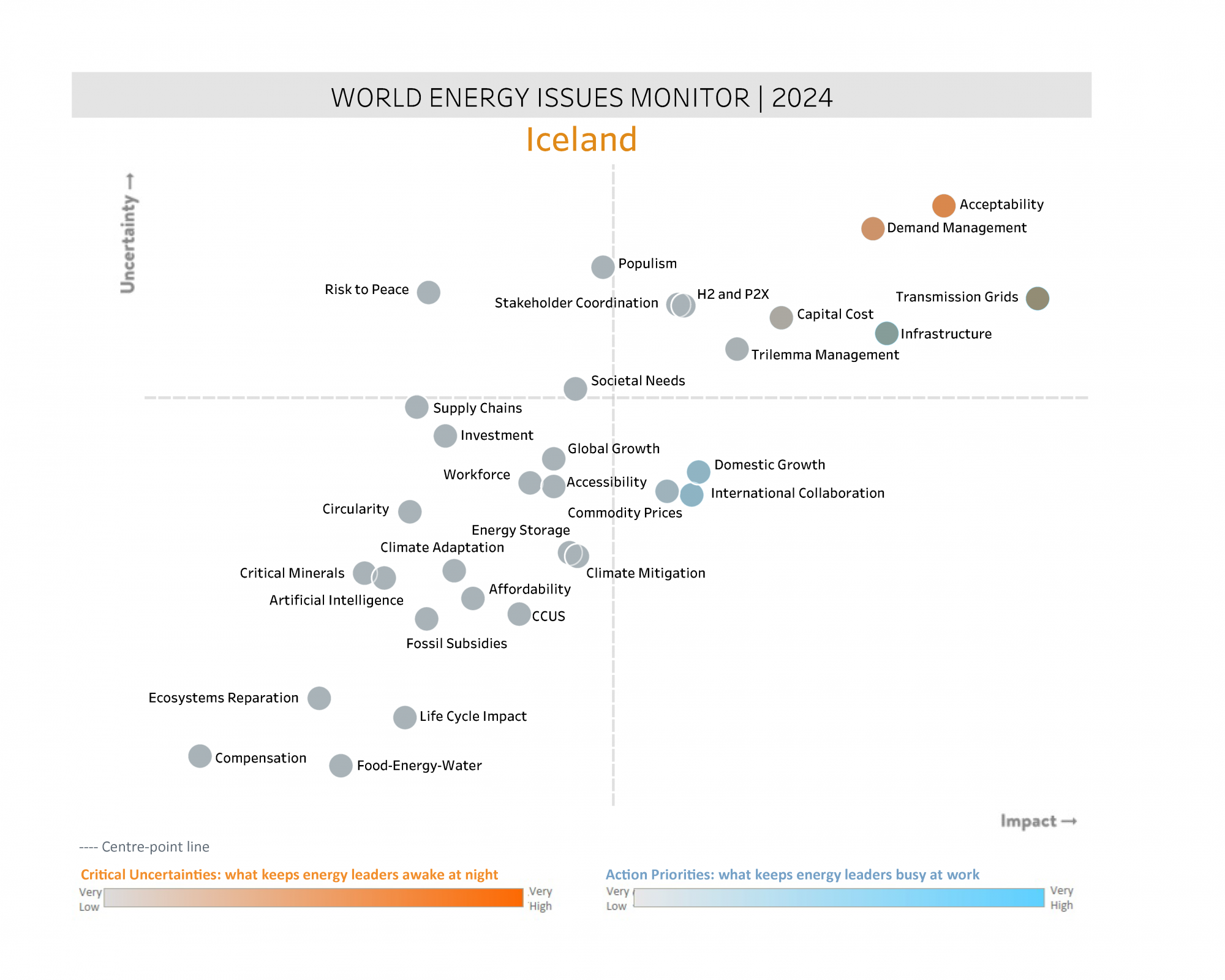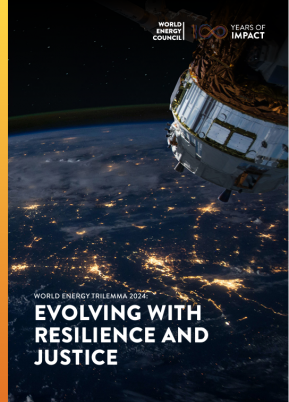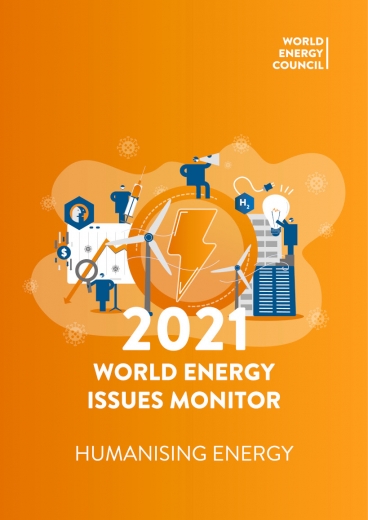The Iceland National Committee aims to promote sustainable energy development in Iceland, as a part of the World Energy Council’s energy vision. As a member of the World Energy Council network, the organisation is committed to representing the Icelandic perspective within national, regional and global energy debates. The committee includes a variety of members to ensure that the diverse energy interests of Iceland are appropriately represented. Members of the committee are invited to attend high-level events, participate in energy-focused study groups, contribute to technical research and be a part of the global energy dialogue.
Halla Hrund Logadóttir is the Director General of Iceland‘s National Energy Authority. She is also an Adjunct Lecturer at the Harvard Kennedy School where she teaches the Arctic course, focusing on climate change and sustainable development. Ms. Logadóttir is the Co-Founder and former Co-Director of the Arctic Initiative at the Harvard Kennedy School and the Founder of the Arctic Innovation Lab, established to encourage business and social innovation across the Arctic region. Previously, Ms. Logadóttir was the Director of the Iceland School of Energy at Reykjavik University where she also taught energy policy. Ms. Logadóttir is a frequent commentator on environment, energy, and innovation. She was one of the 15 invited writers in United Nations Chronicle's special edition on sustainable energy published in relation to COP21 and co-curates the World Economic Forum's Arctic Transformation Map. Among her other roles include being the Co-founder of Girls4Girls non-profit; a global mentorship program which aims to arm young women with the courage, vision, and skills needed to take on public leadership. Earlier, Ms. Logadóttir worked on an entrepreneurship training program in Togo, West Africa, on the "Aid for Trade Initiative," at the OECD in Paris, and as an EU and bilateral officer for Iceland's Minister for Foreign Affairs in Brussels. In 2016, Ms. Logadóttir was selected as a Louis Bacon Environmental Leadership Fellow through Harvard's Center for Public Leadership and earned an MPA degree from the Harvard Kennedy School. Before, Ms. Logadóttir studied a combination of political science, economics, energy policy and trade at the University of Iceland the London School of Economics, and the Fletcher School of Law and Diplomacy at Tufts University.
Baldur Pétursson is Manager - International Projects and Public Relations at the National Energy Authority in Iceland.
In possession of extensive domestic and international experience in administrative work for many years, he has worked as International Projects and Public Relations Manager at the National Energy Authority in Iceland, working on various international projects and programs, e.g. working in cooperation with FMO, World Energy Council, etc. He was also the Head of Unit within the Ministry of Industry and Commerce for several years, as well as Member and/or chairman of several domestic committees and reports on industrial sectors. Moreover, he was Counsellor at the Icelandic Mission to the EU in Brussels, Member of the Board and later Executive Alternate Director at the European Bank for Reconstruction and Development (EBRD) in London, Member of the Board at Islandsbanki in Iceland (2010-12). He has also served as member of several international committees e.g. within OECD, EU, EFTA, EBRD, IPHE, NORA, Nordic Ministerial Council, Energy Charter, World Energy Council (WEC), WEC Europe Committee and WEC Strategy and Communication Committee and Nordic Energy Research.
His educational background includes a MSAS in International Business from Boston University in the United States, Business Administration from the University of Iceland and in possession of the certification Assessment of the Eligibility as Chief Executive Officers and Members of the Boards of Directors of larger Financial Undertakings approved by the Financial Supervisory Authority in Iceland, 2010.
Energy in Iceland

The 2024 World Energy Issues Monitor for Iceland highlights the complexities and challenges of transitioning to a sustainable energy system. The critical uncertainties identified—acceptability, transmission grids, demand management, infrastructure, and capital cost—represent areas where focused efforts and strategic planning are required. Simultaneously, prioritizing actions in transmission grids, infrastructure, international collaboration, domestic growth, and capital cost management will be crucial for Iceland to successfully navigate its energy transition.
Addressing these uncertainties is essential to building a resilient energy system capable of withstanding future demands and challenges. For instance, improving public acceptability involves engaging with communities, enhancing transparency, increase collaboration, improve communication and ensuring that the benefits of energy projects are clearly communicated and distributed.
Critical Uncertainties for Iceland
Acceptability: The public and stakeholder acceptance of new energy projects and policies is a significant uncertainty for Iceland, as in many other countries. This primarily involves conflicts between nature conservation and meeting increasing energy demand. Public opinion and stakeholder support are crucial for the successful implementation of energy projects. Resistance or support from various interest groups can significantly influence the pace and success of energy transition in Iceland as in other countries.
Transmission Grids: The reliability and expansion of transmission grids, and especially the distribution network in remote areas are critical in Iceland. An effective and strong transmission grid is essential for the integration of renewable energy sources, such as from wind, geothermal and hydroelectric power in various locations, which are abundant in Iceland. The ability to transmit electricity efficiently and reliably across the country from various remote renewable resources to end users, is vital for maintaining energy security and stability. The main challenge has often been reaching agreement with landowners and municipalities for building transmission lines on their lands, which is vital for expanding and strengthening the grid to accommodate new sources of energy generation. Challenges include upgrading existing infrastructure and expanding the grid to accommodate new sources of energy generation while also keeping transmission fees stable, increasing transparency and market-based solutions to ensure equal access and better utilisation of the grid. Furthermore, the local government approval process has been a bottleneck for projects after their approval by the regulatory authority.
Demand Management: The isolated electricity system of Iceland is close to maximum capacity and strengthening the supply side has taken long time due to strict and time-consuming license processes and delay of the electricity Master Plan. Therefore, to ensure security of supply, effectively managing energy demand remains vital. Implementing demand response programs, promoting energy efficiency, and encouraging energy intensive users to participate in load balancing the electricity system are all part of demand management. The uncertainty lies in how efficiently the regulatory framework can be updated and the network operators offering smart meters and incentives to improve increased flexibility and better utilisation.
Infrastructure: The development and maintenance of energy infrastructure is essential but faces uncertainties. Infrastructure includes the facilities required for energy production, storage, and distribution. For Iceland, this involves not only maintaining existing infrastructure but also investing in new technologies increase flexibility and facilities to support a growing and diversifying energy sector. Recent volcanic activities have tested the resiliency of the energy infrastructure in one of Iceland’s urban areas, which makes this a critical uncertainty. The legal framework for geothermal district heating and lack of incentives to increase energy efficiency introduce uncertainty, while the resilience of infrastructure against environmental risks is also a key concern.
Capital Cost: The investments costs associated with energy projects and infrastructure represent a significant uncertainty. Financial investment is required and is capital intensive for the development of new energy projects, maintenance of existing infrastructure, and deployment of innovative technologies. Interests on capital has also been high in Iceland, due to cost increases and inflation. Cost overruns and economic feasibility are major challenges, as they can impact the overall viability and attractiveness of energy projects to investors and stakeholders. Project developers and investors in the Icelandic energy system have experienced price surge of key materials and parts as the rest of Europe in the last couple of years, making the cost effectiveness and competitiveness of new investments uncertain.
Action Priorities for Iceland
Transmission Grids: Ensuring better utilisation, increased transparency and equal access, market-based signals to improve efficiency, improved analysis and expansion of the transmission grids and distribution networks, is a top priority for Iceland. A robust and efficient transmission network is necessary to handle the increased generation of renewable energy, from various locations of windmills, geothermal and hydroelectric power, to ensure a stable supply of electricity across the country. Investment in grid infrastructure, modernization of existing systems, and integration of smart grid technologies are essential steps to address this priority. More investment in the transmission grid system is also foreseen in the implementation plan that Landsnet intends to undertake in the next three years.
Infrastructure: Developing and maintaining strong energy infrastructure is crucial for Iceland’s energy transition. Iceland has been experiencing stress on its energy infrastructure due to fast population growth in certain urban areas and volcanic eruption. Adding the planned energy transition of the transportation fleet makes upgrading existing facilities, investing in new technologies, and ensuring the resilience of infrastructure against potential risks a top priority. Strategic planning and investment in infrastructure development are necessary to support the growing demand for energy and the integration of renewable energy sources.
International Collaboration: Collaborating internationally is essential for Iceland to leverage global expertise, share best practices, and access international funding and technological innovations. International collaboration can help Iceland overcome domestic limitations and accelerate the transition to sustainable energy systems. Partnerships with other countries and participation in global energy initiatives can provide valuable insights and resources. Iceland is a member of several international cooperatives like the Agreement on the European Economic Area which include the EU internal electricity market, World Energy Council, Nordic cooperations, ACER, Nordic Energy Research and other international cooperation, that is adding information, knowledge and value. However, Iceland is not yet a member of International Energy Agency as many countries are, something that could strengthen energy security, transition and development.
Domestic Growth: Promoting innovation, improved efficiency, competition and where applicable increased growth within the domestic energy sector is a key priority for Iceland. This involves fostering innovation, supporting local energy companies, and creating a conducive environment for investment in the energy sector. Encouraging domestic growth can boost economic development, enhance energy independence, and create new job opportunities within the country.
Capital Cost: Managing and reducing the capital costs of energy projects is a significant focus area due to recent price increase in key raw material. Optimizing financial resources and ensuring cost-effective implementation of energy projects can enhance their economic viability and attract more investments. This requires careful financial planning, efficient project management, and the exploration of innovative financing mechanisms.
Overall, the successful navigation of Iceland's energy transition will depend on the coordinated efforts of government, industry, and society. Each stakeholder has a vital role to play in addressing the critical uncertainties and action priorities identified in the 2024 World Energy Issues Monitor. By working together, Iceland can continue to have a resilient, sustainable, and efficient energy system that benefits both its population and the planet. Furthermore, through innovation, collaboration, and strategic planning, Iceland has the potential to become a role model in the global energy transition and create a brighter future for generations to come.
Acknowledgements
Iceland Member Committee
Baldur Pétursson and colleagues, National Energy Authority, Iceland
Ivar Baldvinsson and Colleagues, Landsvirkjun, Iceland
Samorka, Federation of Energy and Utility Companies in Iceland
Downloads

Iceland World Energy Trilemma Country Profile 2024
Download PDF
Iceland Energy Issues Monitor 2024
Download PDF
World Energy Issues Monitor 2024
Download PDF








